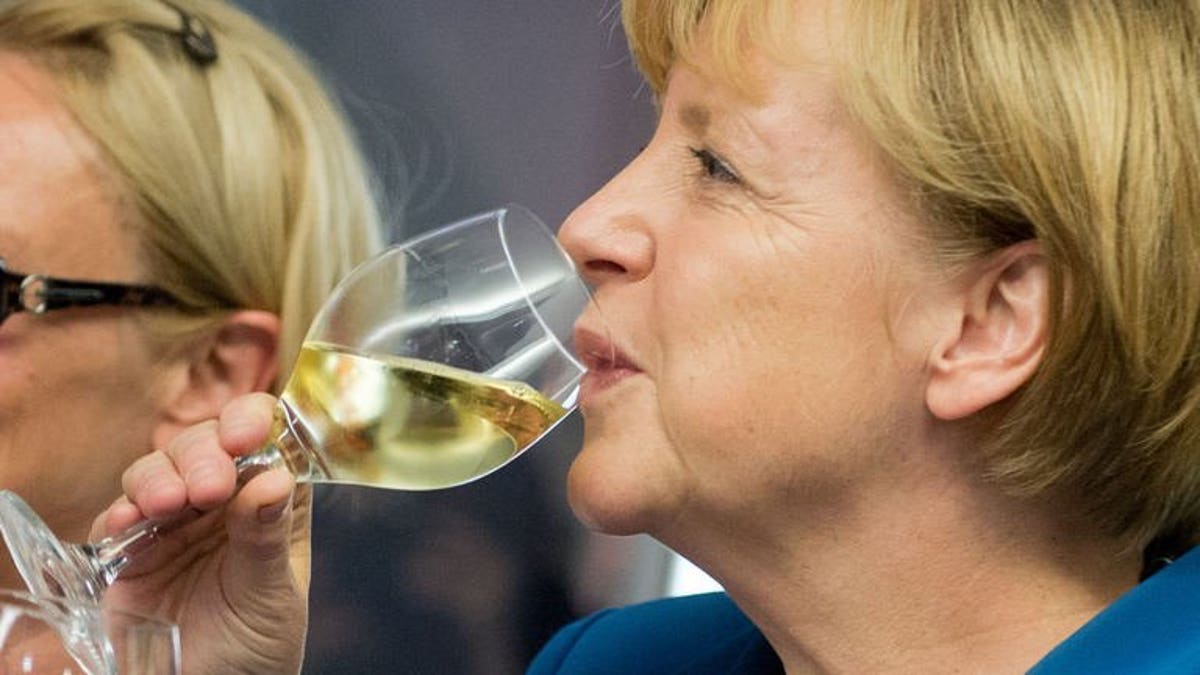
German Chancellor Angela Merkel drinks a glass of wine during the election party of her Christian Democratic Union (CDU) party at the party's headquarters in Berlin on September 22, 2013. (DPA/AFP)
BERLIN (AFP) – A stunning election triumph has left German Chancellor Angela Merkel at the apex of her power, humiliated foes and old allies alike, and rung in what one newspaper dubbed "the era of Merkelism".
The strongest conservative poll result in two decades was a thundering popular endorsement for the leader who is dubbed "Mummy" at home and often called the world's most powerful woman.
It followed a heavily personality-based campaign that focused on Merkel's calm and prudent captaincy through the storms of the eurozone crisis, in which Germany's economy came out unscathed with its triple-A ratings and low unemployment.
In its drive to stay in power, the conservative party "did not bet on a policy but on a person: the chancellor," said the Frankfurter Allgemeine Zeitung daily.
"The Merkel Republic," ran the headline for a commentary on news site Spiegel Online, which declared that "Germany has finally become Angela Merkel-Land".
It said her Christian Democratic Union (CDU) was now all-powerful and back to where it was in chancellor Konrad Adenauer's times, when it ruled alone and presided over rebuilding war-shattered Germany with its "economic miracle".
"The party must thank a chancellor who with her presidential style appeals to broad sections of the population, who doesn't offend, who integrates," the commentary said. "No-one can say exactly what she stands for, but many people feel in good hands with Chancellor Merkel."
Jackson Janes, president of the American Institute for Contemporary German Studies, also pointed to Merkel's reassuring persona in turbulent times as the secret of her success.
"It's that consensus-driven management style -- let's take it easy, let's not get upset, let's move through this -- as opposed to polarising policies where you set up faultlines," he said. "I think that's something Germans kind of like.
"She's like a skier coming down a hill, with a bit of an easy back and forth, to make sure she gets down the hill safely."
A survey released Sunday said a stunning 80 percent of respondents believed the chancellor is doing a good job, while only 17 percent said she isn't, said the institute Forschungsgruppe Wahlen.
"The citizens gave Merkel not just a victory but a triumph," judged the Sueddeutsche Zeitung daily, adding that "she has won it as a person, as chancellor, with popularity ratings that are unique in the history of the federal republic".
"This election has turned the Merkel government terms into an era -- the era of Merkelism."
The commentary added that the flip-side of this was that her party now consists of just Merkel -- a notion confirmed by the countless "Angie" signs waved by her jubilant party supporters and the T-shirt slogan "We are still chancellor".
Berlin political commentator Michael Spreng, a former newspaper journalist and political campaign manager, said that "for the first time Merkel scored a true victory," pointing out that her results in 2005 and 2009 elections had been among the worst in CDU history.
After an election campaign focused on Merkel the person, he said, "Merkel has now joined the ranks of the great CDU victors of the post-war history. With Merkel, Germany obviously feels in safe hands."
But if the election outcome showed how many Germans love Merkel, it also confirmed that as a political operator she is not sentimental about dropping allies who become liabilities, as a number of former cabinet ministers have also found out.
The CDU's trounced allies, the pro-business Free Democrats (FDP), crashed out of parliament for the first time in more than half a century, according to early results, after Merkel had snubbed their desperate call for help on the campaign trail.
Merkel had implored her supporters to resist an FDP call to "split" their district and party votes between the CDU and FDP to save the coalition.
Commentators compared the horrible outcome for the FDP with the bruising the Social Democrats (SPD) in 2009 suffered after a joyless "grand coalition" with the CDU in which it withered in Merkel's shadow.
The Frankfurter Rundschau daily judged that: "Now she has left two partners -- in 2009 the SPD, now the FDP -- in a state where they won't be a threat for her for years to come."
